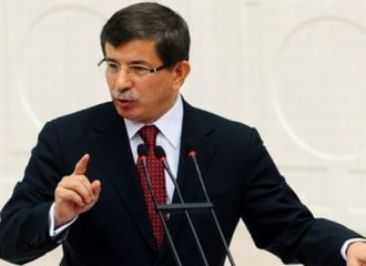Friday, 27 April 2012

Foreign Minister Ahmet Davutoğlu defended the government’s foreign policy regarding Syria as he briefed lawmakers on Thursday on the latest developments in the neighboring country and Turkey’s position regarding its uprising, saying Turkey is determined to lead a “wave of change” in the Middle East.
“A new Middle East is emerging and we will continue to lead this. Turkey will pioneer this order of peace. … The 74 million Turkish people are with the Syrian people and will continue to be,” Davutoğlu said. The briefing comes amidst a fragile cease-fire in the neighboring country brokered by UN-Arab League envoy Kofi Annan to end the 13-month Syrian conflict and talk of harsher measures if the international peace plan, which has been shaken by violence, ultimately collapses.
Turkey has had to consider a variety of options as the tension along the Syrian border escalates, Davutoğlu noted.
“Turkey does not warmonger. People who accuse us of following a hot-blooded policy in Syria should understand that Turkey will not be caught unprepared for any contingency in the Syrian crisis. It is our obligation to determine what measures we would take on our borders with Syria [regarding the escalating tension],” Davutoğlu claimed.
Two Turkish nationals and two Syrians were injured on April 9 at a refugee camp in Kilis province when Syrian forces fired across the border during clashes with opposition fighters that reportedly had attempted to seize control of the border gate and then fled to Turkey. The Turkish government called the incident a border violation and said Turkey would pursue measures under international law in response, raising prospects of military retaliation.
Following the incident, Prime Minister Recep Tayyip Erdoğan referred to NATO’s Article 5 for a collective security defense against Syria. However, NATO Secretary-General Anders Fogh Rasmussen has repeatedly dismissed that NATO is contemplating action against Syria. The 13-month crisis is Syria is due to a brutal offensive pursued by President Bashar al-Assad against dissent. The truce envisaged by international envoy Kofi Annan’s peace plan has been proven to be shaky as the armed conflict between the opposition and the regime continues in such restive towns as Hama and Homs.
Davutoğlu indicated that Turkey always stands with the people of the Middle East, regardless of sectarian, religious or ethnic differences between them, rather than the “minority dictatorships” in the region. “The Syrian regime is not a threat only to the Syrian people; it has become an issue for regional security. We reject all kinds of sectarian and ethnically based politics in the region. At the end of the road, the change in Syria will benefit all its people, not one single ethnic or religious group,” Davutoğlu noted.
The Alawite sect of Assad and his Alawite-dominated government rules a Sunni majority in Syria. Turkey has regularly expressed its concerns with regard to a potential sectarian conflict spilling over into the rest of the region from Syria and Iraq. At the same time, the opposition harshly criticized Davutoğlu’s remarks on the government’s policy regarding Syria.
Defining the policy a failure, CHP Deputy Chairman Osman Korutürk maintained that “Turkey has turned into an interventionist country, meddling in the internal affairs of its neighbors, instigating war and taking part in regional conflicts.” “Turkey has become an isolated country within the international community due to its Syria policy. It pretended to back Annan’s peace plan but has created a perception that it supports a military intervention in Syria,” Korutürk added.